Russian President Vladimir Putin scoffed at the possibility of his country launching an attack on a NATO member, calling it “sheer nonsense,” but warned that any Western air base hosting U.S.-made F-16 fighter jets that are slated for deployment in Ukraine would be a “legitimate target” for the Kremlin’s forces.
“Their statements about our alleged intention to attack Europe after Ukraine is sheer nonsense,” Putin said late Wednesday, referring to warnings in the U.S. and Western Europe that Russia could turn its sights on other countries unless it’s stopped.
He noted that the U.S. defense budget is more than 10 times higher than Russia’s.
“In view of that, are we going to wage a war against NATO? It’s ravings,” he told military pilots during a visit to an air base.
Ukraine is awaiting the delivery of F-16s, which will increase military pressure on Russia, from its Western partners. Ukrainian President Volodymyr Zelenskyy said last year that 42 F-16s had been promised. Ukrainian pilots have been training in the West for months on how to fly the warplanes.
The F-16s require a high standard of runways and reinforced hangars to protect them from bombing attacks when they are on the ground. It’s not clear how many Ukrainian air bases can meet those requirements, and Russia would be certain to quickly target a few that could accommodate them once the jets arrive.
Putin warned Ukraine’s Western allies against providing air bases in their countries from where the F-16s could launch sorties against the Kremlin’s forces. Those bases would become a “legitimate target,” he said.
“F-16s are capable of carrying nuclear weapons, and we will also need to take that into account while organizing our combat operations,” Putin added.
Military analysts have said the arrival of F-16s won’t be a game-changer in view of Russia’s massive air force and sophisticated air defense systems, though Ukrainian officials have welcomed them as an opportunity to hit back at Russia’s air dominance.
Putin insisted the F-16s “won’t change the situation on the battlefield.”
“We will destroy their warplanes just as we destroy their tanks, armored vehicles and other equipment, including multiple rocket launchers,” he said.
F-16s can be used to bolster Ukraine’s capability to target Russian facilities with long-range missile strikes. Ukraine’s counteroffensive last year came up short in part because it took place without air cover, placing its troops at the mercy of Russian aviation and artillery.
Russia has maintained air dominance in the war with Ukraine, though the provision of sophisticated Western air defense systems has forced Russian warplanes to avoid Ukrainian skies and launch attacks while remaining over Russia-controlled territory.
On Thursday, a Russian fighter jet crashed into the Black Sea off the Russia-occupied Crimean Peninsula, Sevastopol Gov. Mikhail Razvozhayev said. The pilot ejected and was recovered by rescue teams about 200 meters from shore, he said. Razvozhayev provided no details about the possible cause of the crash.
The Kremlin currently has a battlefield edge in weapons and troops, yielding recent incremental gains at points on the around 1,000-kilometer (620-mile) front line, as Kyiv awaits more promised Western military support and mulls a broader mobilization.
Russia fired salvos of drones and missiles overnight at southern and eastern regions of Ukraine, authorities said Thursday, wounding more than a dozen people as the Kremlin’s forces persevered with attritional attacks designed to wear down Ukrainian defenses.
Air defense systems intercepted 26 out of 28 Shahed drones, Ukraine’s air force said. Russian forces also launched five missiles overnight, it said.
The regular bombardment of Ukraine by the Kremlin’s forces during the war has recently gained momentum, with missile barrages of the capital, Kyiv, and strikes on energy facilities across the country. The attacks also aim to weaken Ukrainian morale and act as retribution for Ukrainian long-range strikes on Russian soil.
One of Russia’s goals is to “deplete Ukraine’s inventory of ground-based air defense,” according to a recent military assessment published by the International Institute for Strategic Studies.
That would erode some of Ukraine’s combat ability as it waits on pledged but delayed military support from the West, including ammunition for its artillery and air defenses.
“Kyiv is confronted by the threat that an attritional war in the air domain will increasingly favor Russia without adequate support from the U.S. and its allies,” the IISS said. “Ukraine’s ability to continue to counter Russian air threats and impose costs on the Russian Aerospace Forces remains important to the outcome of the war.”
Ukrainian Foreign Minister Dmytro Kuleba and Defense Minister Rustan Umerov both pleaded with foreign allies on Thursday to send more air defense systems and missiles.
The Ukrainian Mission to NATO said that it convened an extraordinary ambassador-level meeting of the NATO-Ukraine Council at the alliance’s headquarters on Thursday in response to Russia’s missile attacks on critical infrastructure.
“Ukraine urgently requires more air defense and interceptors,” especially Patriot systems that can intercept ballistic missiles, Kuleba said in a video posted on X, formerly Twitter. Ukraine is the only country in the world targeted by ballistic missiles almost daily, he said.
Authorities in the Mykolaiv region, near the Black Sea in southern Ukraine, said that 12 people were wounded and six residential buildings were damaged in a Russian strike with a ballistic missile on the city on Wednesday afternoon.
In an overnight attack on the southern Ukraine region of Zaporizhzhia, Shahed drones struck a residential area, injuring two women ages 72 and 74, according to regional Gov. Ivan Fedorov. Rescue services said that seven buildings were damaged.
The Black Sea city of Odesa repelled three missile and drone attacks, officials said.

